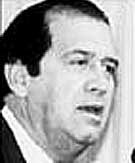
July 3, 1993
Case: Jorge Carpio Nicolle

|
Case File:
Date of murder:
July 3, 1993
Where and how murdered:
More than 30 armed and hooded men ambushed the caravan in which Carpio was traveling along a rural highway in Quiche department at a place known as El Molino. About 8:45 p.m. four shots were fired at him at point-blank range. The assailants killed three persons traveling with him before fleeing. Carpio Nicolle died several hours later at a local hospital. His wife was unhurt in the incident.
Possible motives:
He was believed to have been murdered in a political-military conspiracy for his staunch refusal — voiced in his editorials — to accept an amnesty that would protect civilians and military officers who had supported the "self-coup" staged by President Jorge Serrano Elias in May 1993. Some, howeve r, hold that he was killed as a way of sending a message to his cousin, Ramiro de Leon Carpio, whom Congress a month earlier had appointed president of Guatemala. The government consistently maintained that it was a simple assault carried out by common criminals.
Suspects:
Members of a criminal gang known as "Los Churuneles" were jailed for 10 months as suspects. They were freed after the police Crime Division issued a report blaming a Civil Defense Patrol in San Pedro de Jocopilas, in Quiche department, for the crime. Of the 10 patrol members held, nine were freed: the one remaining in jail in that case and another, Juan Acabal Patzán, have yet to be sentenced. Who may be behind the murder remains unknown, but there are suspicions that senior officers of military intelligence may be implicated.
Violent consequences:
A member of the San Pedro de Jocopilas Civil Defense Patrol and the Quiche police chief — who first investigated the case — were later murdered. Several eyewitnesses, a public prosecutor and two judges in Quiche received threats. Some files were destroyed in a fire-bomb attack on offices where the case file was housed. Members of the murdered men’s families received threats — and continue to do so. They are the targets of an ongoing campaign to discredit them.
Irregularities in the legal proceedings:
Crime scene investigations were not carried out skillfully or speedily, and the results vanished. Also missing were autopsy photographs and reports. A ballistics report and a weapon were believed to have been adulterated. The whole case file disappeared for 10 days. Weapons seized from the initial suspects also disappeared. A public prosecutor switched sides and became a defense attorney for the suspects. Two judges and nine prosecutors refused to take the case, for fear of reprisals. The special public prosecutor now involved says he fears for his life.
Personal File:
Place of birth:
Guatemala City
Age at time of death:
60
Marital status:
Married to Martha Elena Arrivillaga
Children: (names and ages at time of father’s death)
Rodrigo, 31, and Jorge, 33
Education:
Graduated from the University of San Carlos, Guatemala, with a degree in political science.
Profession / occupation:
Journalist and politician. Editor and publisher of the daily El Gráfico.
Journalism background:
Publisher of the magazine Mi Finca, 1959; Extra del Gráfico, 1965; The dailies La Tarde, 1970, and La Razon, 1982, and the weekly El Deportivo, 1975. Founder, editor and publisher of the newspapers Gráfico Deportivo, 1960; Gráfico del Jueves, 1961, and El Gráfico, 1963.
Years as a journalist:
33 years
Awards and distinctions:
Kim de Oro Award of the Federation of Communications Media of Central America and Panama. Received the keys to the cities of Los Angeles and Miami. Awarded various honors and decorations posthumously.
Civic activities:
In 1982 was president of the Red Cross of Guatemala and chief of the Municipal Fire Department. President of the Federation of Communications Media of Central America and Panama 1982-83. Founder and president of the National Central Union (UCN) party, of which he was presidential candidate in the 1985 and 1990 elections.
Hobbies:
Collector of pre-Columbian artifacts, colonial and modern art. Played the guitar. Enjoyed reading about history and economics.
|